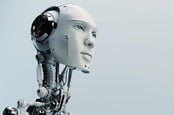This article is more than 1 year old
No wonder Marvin the robot was miserable: AI will make the rich richer – and the poor poorer
I think you ought to know why I’m feeling very depressed
Two research papers argue that the risk of AI-driven automation isn't so much the destruction of jobs as the amplification of wealth inequality.
That is to say workers in our brave new world will still have things to do, but many of them, assisting and assisted by machines, will be paid poorly while robot owners get rich.
In "Artificial Intelligence and Its Implications for Income Distribution and Unemployment," presented last month through the National Bureau of Economic Research, economists Anton Korinek (Johns Hopkins University) and Joseph E. Stiglitz (Columbia University) contend "the primary economic challenge posed by the proliferation of AI will be one of income distribution."
Korinek and Stiglitz tackle the issue at length and consider a variety of possible economic scenarios arising from improvements in AI. They call out the fallacy that there's a fixed number of jobs and that if automation destroys jobs, there will be fewer.
But they balance theoretical economic positives – that technological progress creates additional income and the potential for more jobs – with observations about why the benefits may not accrue to everyone in equal measure.
They anticipate a period like the Great Depression, when agricultural innovations meant fewer workers were needed to produce food, reducing agricultural prices and incomes, and thereby driving down demand for urban products.
"There are clear parallels to the situation today in that a significant fraction of the workforce may not have the skills required to succeed in the age of AI," they wrote.
They suggest job subsidies may be preferable to universal basic income payments for workers as a response to AI disruption because some argue that work, in addition to fulfilling the practical need for money, can provide people with a sense of purpose and dignity.
There's some dystopian speculation too. The authors mull the possibility of AI augmenting the wealthy to the extent that it gives them a competitive economic advantage.
"If intelligence becomes a matter of ability‐to‐pay, it is conceivable that the wealthiest (enhanced) humans will become orders of magnitude more productive – 'more intelligent' – than the unenhanced, leaving the majority of the population further and further behind," they write.
They liken the potential inequity following from the deployment of AI to the US healthcare system.
"In the US, for example, the expected life spans of the poor and the wealthy have diverged significantly in recent decades, in part because of unequal access to healthcare and ever more costly new technologies that are only available to those who can pay," they state.
With adequate policy intervention to mitigate the socio-economic impact of AI-driven changes, the authors anticipate the transition can be managed in a way that's generally beneficial. Without it, not so much.
"In the absence of such intervention, worker‐replacing technological change may not only lead to workers getting a diminishing fraction of national income, but may actually make them worse off in absolute terms," the conclude.
The second paper, "Managing automation: Employment, inequality and ethics in the digital age," from the Institute for Public Policy Research , a London-based think tank, makes a similar argument.
Penned by IPPR researchers Mathew Lawrence, Carys Roberts, and Loren King, the paper asserts that jobs will be transformed by automation rather than eliminated and that inequality is likely to rise without regulatory attention.
"In the absence of policy intervention, the most likely outcome of automation is an increase in inequalities of wealth, income and power," the IPPR paper states.
Such advice borders on heresy among US tech companies, which reflexively argue for self-regulation rather than codified limits on behavior.
But the hands-off approach advocated by Silicon Valley looks increasingly untenable in light of the angst over social media platforms as a vector for incivility, deceptive ads, and privacy violations.
Peril
Microsoft's blog post earlier this week, declaring its interest in creating "a modern policy environment in which cloud technology can be developed and deployed in a trusted, responsible and inclusive way," suggests tech companies recognize the imminent peril to business as usual.
The IPPR paper, nonetheless, calls for more robots and more rapid deployment of technology, because lack of adoption in the UK holds the local economy back. It also recommends the establishment of a regulatory body to oversee AI called the Authority for the Ethical Use of Robotics and Artificial Intelligence, missing the opportunity to create a snappy acronym.
Noting that richest 10 per cent in the UK own five times more wealth than the poorest 50 per cent, the paper suggests rethinking ownership models to share the supposed robo-bounty.
"As capital in the form of machines becomes more important in the economy, 'Who owns the robots?' becomes a vital determinant of the distribution of prosperity," the paper states.
If only a Roomba receipt were a ticket to a landlord's life of leisure. ®
PS: Here's a research paper, out this month, on how to fool machine-learning software using audio.

